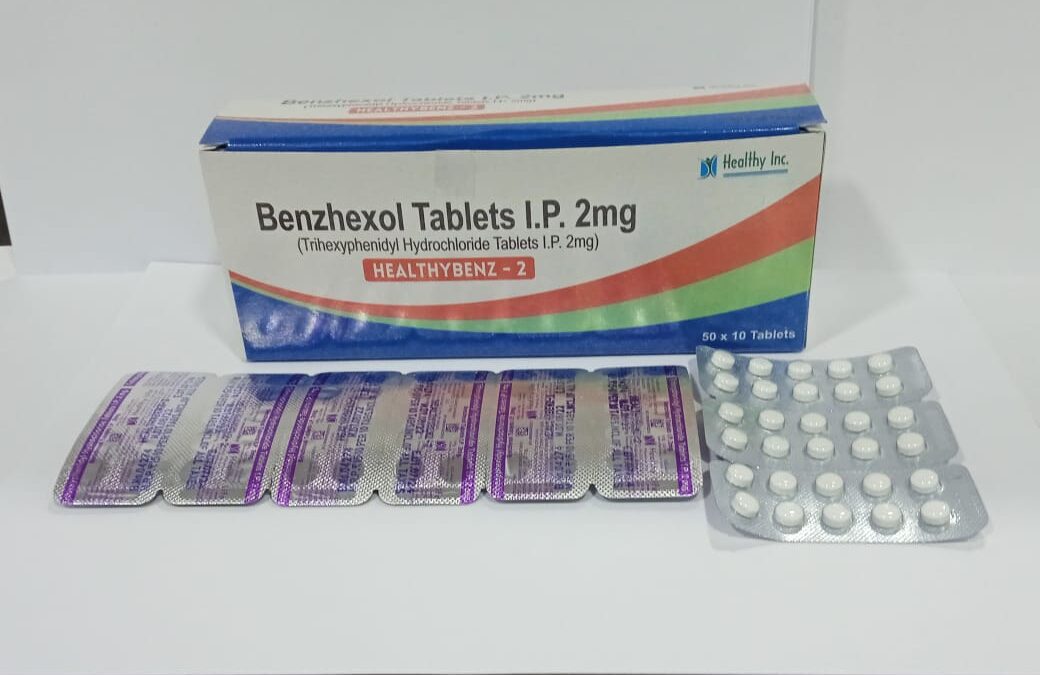Benzhexol hydrochloride tablets Use

Azithromycin dispersible Tablets Use
20/11/2023
Bisacodyl tablets
20/11/2023Benzhexol hydrochloride tablet manufacturer
Benzhexol hydrochloride, also known as trihexyphenidyl hydrochloride, is a medication primarily used to treat symptoms of Parkinson’s disease and certain other movement disorders. It is available in tablet form and is usually taken orally. Here’s some important information about this medication:
Indications: Benzhexol hydrochloride is prescribed to manage the symptoms of Parkinson’s disease, including muscle stiffness, tremors, and involuntary movements. It can also be used to alleviate similar symptoms in other conditions, such as extrapyramidal side effects induced by certain medications.
Mechanism of Action: The drug works by blocking acetylcholine receptors in the brain, which helps to restore the balance between dopamine and acetylcholine, two important neurotransmitters involved in motor control.
Dosage: The dosage of benzhexol hydrochloride can vary depending on the individual and the specific condition being treated. It’s important to follow the prescribing doctor’s instructions carefully.
Side Effects: Common side effects of benzhexol hydrochloride may include dry mouth, blurred vision, constipation, dizziness, and urinary retention. Less common but more serious side effects can include confusion, hallucinations, and allergic reactions.
Precautions: Before taking this medication, it’s important to inform your doctor of any allergies or medical conditions you have. Additionally, let your doctor know about any other medications you are taking, as there can be interactions with certain drugs.
Drug Interactions: Benzhexol hydrochloride may interact with other medications, including antihistamines, antipsychotic drugs, and certain antidepressants. It’s crucial to inform your healthcare provider of all the medications you are taking to avoid potential interactions.
Special Populations: It is important to exercise caution when prescribing this medication to the elderly, as they may be more sensitive to its side effects. Pregnant and breastfeeding women should consult with their healthcare provider about the potential risks and benefits of using this medication.
Overdose: An overdose of benzhexol hydrochloride can be dangerous and may lead to symptoms like hallucinations, seizures, and extreme agitation. If you suspect an overdose, seek immediate medical attention.
Discontinuation: Do not stop taking this medication abruptly without consulting your doctor, as this can lead to a worsening of your condition or the emergence of withdrawal symptoms.
Storage: Store the tablets at room temperature, away from moisture and heat.
Please note that the information provided here is for general knowledge, and it’s essential to consult a healthcare professional for specific advice and guidance regarding the use of benzhexol hydrochloride or any medication.
Benzhexol hydrochloride, also known as trihexyphenidyl hydrochloride, is a medication that belongs to the class of drugs known as anticholinergic agents. It is primarily used to treat various medical conditions, particularly those associated with involuntary muscle movements and tremors, such as Parkinson’s disease and extrapyramidal symptoms induced by certain antipsychotic medications.
Here are some key points about benzhexol hydrochloride tablets:
Medical Uses:Parkinson’s Disease: Benzhexol hydrochloride is often used in the management of Parkinson’s disease to alleviate some of the motor symptoms, such as muscle stiffness and tremors.
Extrapyramidal Symptoms: It can be prescribed to counteract the side effects of certain antipsychotic drugs, which can cause involuntary muscle movements and restlessness.
Mechanism of Action:Benzhexol hydrochloride exerts its effects by blocking the action of acetylcholine, a neurotransmitter that plays a role in muscle control and various other bodily functions.
By blocking acetylcholine, the medication can help reduce muscle rigidity and tremors.
Dosage:The dosage of benzhexol hydrochloride tablets can vary depending on the condition being treated and individual patient factors.
It’s important to follow your doctor’s prescribed dosage and instructions.
Side Effects:Common side effects may include dry mouth, blurred vision, constipation, and urinary retention.
Less common side effects can include dizziness, drowsiness, and confusion.
Precautions:Patients with a history of glaucoma, prostatic hypertrophy, or certain other medical conditions may need to use this medication with caution.
It may interact with other medications, so it’s important to inform your healthcare provider about all the drugs you are taking.
Duration of Use:Treatment duration can vary, and patients should follow their doctor’s recommendations for when and how to take the medication.


